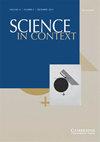Noblewomen’s Devotional Song Practice in ‘Patiençe veinque tout’ (1647–1655), a German Manuscript from the Mid-seventeenth Century
IF 0.5
4区 哲学
Q2 Arts and Humanities
引用次数: 0
Abstract
"Devotional song in the German vernacular was a large repertory in the seventeenth century; as Robert Kendrick points out, the more than two thousand printed collections of these songs produced at this time attest to a relatively musically literate public that engaged with the repertoire. Most published devotional songs appeared in collections, usually consisting of a foreword or dedications, other poetry, and songs. The songs themselves often appeared without printed musical notation, indicating the use of contrafactum. Both men and women contributed to the German devotional song repertoire; however, there is a notable number of original song texts written by women. The 1703 publication Glauben-schallende und Himmel-steigende Herzens-Music, for example, contains 1,052 devotional songs, of which 211 have texts written by women. Women’s performance of devotional texts—whether by singing, recitation, or reading—was a practice that demonstrated their deep internalisation of the text itself whilst also providing a socially acceptable means of self-expression. This article focuses on a mid-seventeenth century manuscript songbook compiled by Duchess Sophie Elisabeth of Braunschweig-Lüneburg (1613–1676). It suggests that at least three songs in the manuscript have poetry and/or music written by noblewomen other than the duchess, including Juliane of Oldenburg-Delmenhorst (1615–1691) and Maria Magdalena of Waldeck-Wildungen (1606–1671). This suggestion is based on two notable features of Sophie Elisabeth’s meticulous recording practices in ‘Patiençe veinque tout’ that are missing from the songs in question. First, the authorship of these three songs is ambiguous, whereas the text and music for all other songs in the source are either made clear by Sophie Elisabeth’s own annotations accompanying each song, or are easily traceable. Second, none of the three songs include the duchess’s monogram, a date of composition, nor any other note stating her authorship (one or more of these notations are included for the songs in ‘Patiençe veinque tout’ that are of her own creation). In investigating the provenance of these songs, this article highlights the fact that women’s original texts, which are often overlooked, form a sizeable and significant body of musical literature from the early modern period. The two complementary practices of writing and performance paint an intimate portrait of women’s confessional and personal identity and the role music played in forming this identity, while also reflecting broader cross-confessional trends towards spiritual interiority and personal piety in the seventeenth century."17世纪中期德国手稿《patiene veinque tout》(1647-1655)中贵妇祈祷歌曲的练习
" 17世纪德国方言中的祈祷歌是一个很大的剧目;正如Robert Kendrick所指出的那样,在这个时期,这些歌曲的两千多张印刷集证明了一个相对有音乐素养的公众参与了这些曲目。大多数已出版的祈祷歌曲出现在合集中,通常由前言或献词、其他诗歌和歌曲组成。歌曲本身往往没有印刷乐谱,表明使用契约。男性和女性都为德国祈祷歌曲曲目做出了贡献;然而,女性创作的原创歌曲文本数量也相当可观。例如,1703年出版的《Glauben-schallende und Himmel-steigende Herzens-Music》收录了1052首宗教歌曲,其中211首是由女性创作的。女性对虔诚文本的表演——无论是唱歌、背诵还是阅读——都是一种实践,表明了她们对文本本身的深刻内化,同时也提供了一种社会可接受的自我表达方式。这篇文章的重点是由公爵夫人苏菲·伊丽莎白的布伦瑞克- 内堡(1613-1676)编写的17世纪中期的手稿歌本。它表明,手稿中至少有三首歌曲是由公爵夫人以外的贵族女性创作的诗歌和/或音乐,包括奥尔登堡-德尔门霍斯特的朱莉安娜(1615-1691)和瓦尔德克-威尔登根的玛丽亚·玛格达莱娜(1606-1671)。这个建议是基于苏菲·伊丽莎白在“patien veinque tout”中细致的录音实践的两个显著特征,而这些特征在有问题的歌曲中是缺失的。首先,这三首歌的作者是模棱两可的,而来源中所有其他歌曲的文本和音乐要么是由索菲·伊丽莎白自己在每首歌上的注释弄清楚的,要么是很容易追踪的。其次,这三首歌都没有包含公爵夫人的字母组合、创作日期,也没有任何其他说明她的作者身份的注释(《patien e veinque tout》中包含了她自己创作的歌曲中的一个或多个注释)。在调查这些歌曲的来源时,本文强调了这样一个事实,即女性的原始文本,往往被忽视,形成了近代早期音乐文学的一个相当大的和重要的主体。写作和表演这两种互补的做法描绘了女性的忏悔和个人身份以及音乐在形成这种身份中所扮演的角色的亲密肖像,同时也反映了17世纪更广泛的跨忏悔趋势,即精神内在和个人虔诚。”
本文章由计算机程序翻译,如有差异,请以英文原文为准。
求助全文
约1分钟内获得全文
求助全文
来源期刊

Science in Context
综合性期刊-科学史与科学哲学
CiteScore
0.80
自引率
0.00%
发文量
1
审稿时长
>12 weeks
期刊介绍:
Science in Context is an international journal edited at The Cohn Institute for the History and Philosophy of Science and Ideas, Tel Aviv University, with the support of the Van Leer Jerusalem Institute. It is devoted to the study of the sciences from the points of view of comparative epistemology and historical sociology of scientific knowledge. The journal is committed to an interdisciplinary approach to the study of science and its cultural development - it does not segregate considerations drawn from history, philosophy and sociology. Controversies within scientific knowledge and debates about methodology are presented in their contexts.
 求助内容:
求助内容: 应助结果提醒方式:
应助结果提醒方式:


